Filter by
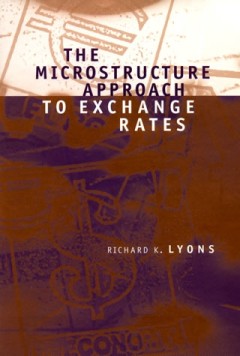
The microstructure approach to exchange rates
"Historically, the fields of exchange-rate economics and microstructure finance have progressed independently of each other. Recent interaction, however, has given rise to a microstructure approach to exchange rates. This book focuses on the economics of financial information and on how microstructure tools help to clarify the types of information most relevant to exchange rates." "The book sho…
- Edition
- -
- ISBN/ISSN
- 9780262622059
- Collation
- -
- Series Title
- -
- Call Number
- -
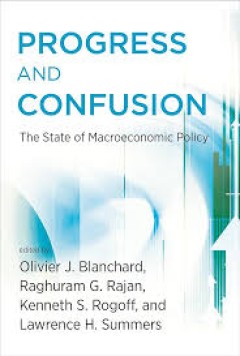
Progress and confusion the state of macroeconomic policy
Leading economists consider the shape and future of economic policy: Will it resume the pre-crisis consensus or contend with the post-crisis "new normal"? Have we made progress with addressing the major issues or does confusion remain in today's economic environment? Chapters address topics that range from the measurement of systemic risk to foreign exchange intervention.OCLC-licensed vendor bi…
- Edition
- -
- ISBN/ISSN
- 9780262333450
- Collation
- 1 online resource (vii, 304 pages) :illustrations
- Series Title
- -
- Call Number
- -
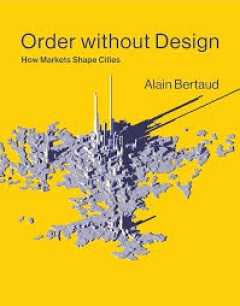
Order without design how markets shape cities
"This book emerges from a 55-year career in urban planning, and is illustrated by the author's real-world experience. Without understanding how markets work, urban planners are likely to design infrastructure and regulations that will adversely impact the functioning of cities. By contrast, urban economists review decisions and outcomes after the fact, often publishing their conclusions in spec…
- Edition
- -
- ISBN/ISSN
- 9780262349215
- Collation
- 1 online resource.
- Series Title
- -
- Call Number
- -
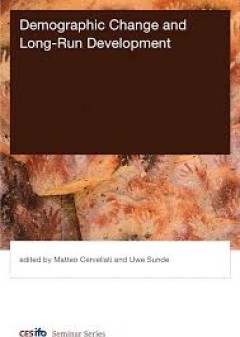
Demographic change and long-run development
Recent approaches to economic demography, investigating the effect of the transition to low mortality and low fertility on economic development.OCLC-licensed vendor bibliographic record.
- Edition
- -
- ISBN/ISSN
- 9780262341660
- Collation
- 1 online resource (vi, 354 pages).
- Series Title
- -
- Call Number
- -
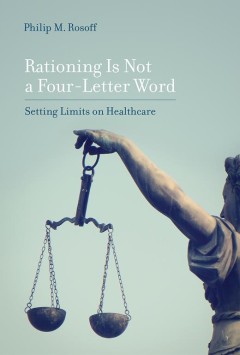
Rationing is not a four-letter word : setting limits on healthcare
"Most people would agree that the healthcare system in the United States is a mess. Healthcare accounts for a larger percentage of gross domestic product in the United States than in any other industrialized nation, but health outcomes do not reflect this enormous investment. In this book, Philip Rosoff offers a provocative proposal for providing quality healthcare to all Americans and controll…
- Edition
- -
- ISBN/ISSN
- 0262320762
- Collation
- 1 online resource (xiv, 320 pages).
- Series Title
- -
- Call Number
- -
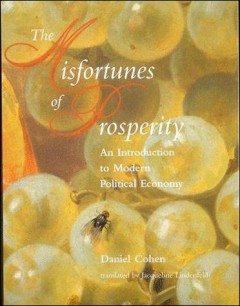
Misfortunes of Prosperity :
Elucidates the current debates on these and other questions in a fast-paced and incisive tour of the dominant ideas in political economy, summarizing historical and theoretical perspectives on the causes of economic growth in the United States, Western Europe, Japan and elsewhere as the twentieth-century draws to a close.Translated by Jacqueline Lindenfeld Are robust economic growth and tight s…
- Edition
- -
- ISBN/ISSN
- 9780262517065
- Collation
- -
- Series Title
- -
- Call Number
- -
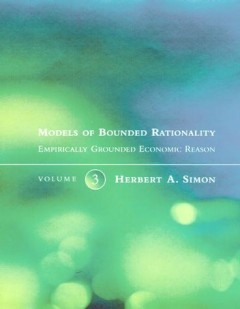
Models of bounded rationality.
Offering alternative models based on such concepts as satisficing (acceptance of viable choices that may not be the undiscoverable optimum) and bounded rationality (the limited extent to which rational calculation can direct human behavior), Simon shows concretely why more empirical research based on experiments and direct observation, rather than just statistical analysis of economic aggregate…
- Edition
- -
- ISBN/ISSN
- 9780262283649
- Collation
- -
- Series Title
- -
- Call Number
- -
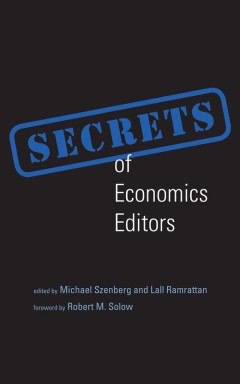
Secrets of Economics Editors
"Experienced economics editors discuss navigating the world of scholarly journals, with details on submission, reviews, acceptance, rejection, and editorial policy."--Provided by publisher.OCLC-licensed vendor bibliographic record.
- Edition
- -
- ISBN/ISSN
- 0262320118
- Collation
- 1 online resource (xvii, 389 pages)
- Series Title
- -
- Call Number
- -
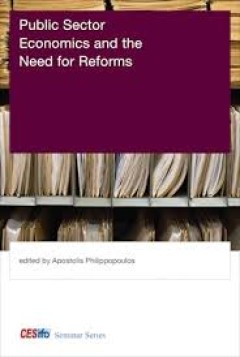
Public sector economics and the need for reforms
Theoretically and empirically informed studies on the role and efficiency of the public sector, public wage and employment policy, privatization, tax policy, and fiscal sustainability.OCLC-licensed vendor bibliographic record.
- Edition
- -
- ISBN/ISSN
- 9780262332361
- Collation
- 1 online resource.
- Series Title
- -
- Call Number
- -

Economy in Society: Essays in Honor of Michael J. Piore
Prominent economists discuss internal labor markets, the dynamics of immigration, labor market regulation, and other key topics in the work of Michael J. Piore. In Economy in Society, five prominent social scientists honor Michael J. Piore in original essays that explore key topics in Piore's work and make significant independent contributions in their own right. Piore is distinctive for his or…
- Edition
- -
- ISBN/ISSN
- 0262305372
- Collation
- 1 online resource (167 pages) :illustrations
- Series Title
- -
- Call Number
- -
 Computer Science, Information & General Works
Computer Science, Information & General Works  Philosophy & Psychology
Philosophy & Psychology  Religion
Religion  Social Sciences
Social Sciences  Language
Language  Pure Science
Pure Science  Applied Sciences
Applied Sciences  Art & Recreation
Art & Recreation  Literature
Literature  History & Geography
History & Geography